| Srl | Item |
| 1 |
ID:
077006
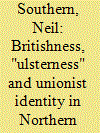

|
|
|
|
|
| Publication |
2007.
|
| Summary/Abstract |
The issue of national identity is a fundamental aspect of inter-community disputes and hostilities in Northern Ireland. The Troubles cannot be severed from the different national claims of unionists and nationalists. But the British identity claimed by unionists has been doubted by some commentators whose work has raised searching questions with regard to the substance and genuineness of the claim. This article approaches the subject by exploring the national self-understandings of key members of the unionist community. The findings of this research suggest that there is emotional depth to the Britishness of these individuals. It recommends that their sense of nationality needs to be taken seriously rather than dismissed as a product of pragmatism or reduced to the level of superficiality
|
|
|
|
|
|
|
|
|
|
|
|
|
|
|
|
| 2 |
ID:
140736
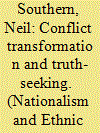

|
|
|
|
|
| Summary/Abstract |
The main work of South Africa's Truth and Reconciliation Commission (TRC) took place between 1996 and the publication of its final report in 1998. Its purpose was to assist citizens come to terms with the violence of the past. All participants in the conflict were subjected to the Commission's investigations including the National Party that had held power from 1948 to 1994. During these years, the party became well established as both an ethnic and racial party. However, support for it fell dramatically between 1994 and 1999 (the year after the TRC published its report). The party's fortunes worsened in the 2004 elections that resulted in its dissolution in 2005. This article explores the effects of the truth-seeking process on the electoral fortunes of the party. The analysis makes use of unique qualitative material gained from research conducted with former senior members of the National Party including two cabinet ministers.
|
|
|
|
|
|
|
|
|
|
|
|
|
|
|
|
| 3 |
ID:
173867
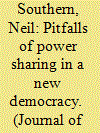

|
|
|
|
|
| Summary/Abstract |
A key political feature of South Africa's transformation was the African National Congress, the National Party and Inkatha Freedom Party working together in a grand coalition. This arrangement was praised by leading power-sharing theorist Arend Lijphart. The unity government began in 1994 but two years later the National Party withdrew. This article explores power sharing during the initial phase of the settlement and discusses three aspects of it. First, the South African example points to the electoral drawbacks of power sharing for minor parties. Second, the National Party's participation in the coalition stifled the early development of substantial political opposition which slowed the pace of democratic consolidation. Third, participation in a power-sharing arrangement undermined the National Party's electoral fortunes contributing to its dissolution in 2005. This was an unexpected outcome for a party which had co-authored the country's settlement a little over a decade earlier.
|
|
|
|
|
|
|
|
|
|
|
|
|
|
|
|
| 4 |
ID:
162780
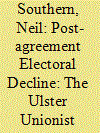

|
|
|
|
|
| Summary/Abstract |
Peace agreements can be costly affairs for political parties. Although a party may have been fundamental in helping resolve conflict this does not mean it will reap the electoral benefits in the post-settlement period. Instead, a party’s support base can significantly wither. The Ulster Unionist Party in Northern Ireland has been affected in this way. This article examines the effects of the decommissioning of terrorist weaponry on support levels for the party. It explores the pitfalls of leaving a divisive issue - a negotiated loose end - unresolved in the Belfast Agreement of 1998.
|
|
|
|
|
|
|
|
|
|
|
|
|
|
|
|
| 5 |
ID:
080879
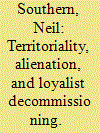

|
|
|
|
|
| Publication |
2008.
|
| Summary/Abstract |
During the Northern Ireland Troubles some Protestant communities suffered more than others. The loyalist Shankill area of West Belfast is one such place. Geographically situated between the republican strongholds of the Ardoyne and Falls, it was regularly exposed to violent attack. The area witnessed a series of republican bombings that included children in the death toll as well as many deadly shootings. Violence of this kind has left an indelible mark on the Shankill community. However, more than other loyalist areas, it was prepared to respond to republican violence with violence. But the community has not emerged from the Troubles with confidence. Unanticipated post-conflict factors of a political, cultural, and territorial nature are undermining efforts to promote community confidence and encourage paramilitary groups to decommission their weapons.
|
|
|
|
|
|
|
|
|
|
|
|
|
|
|
|